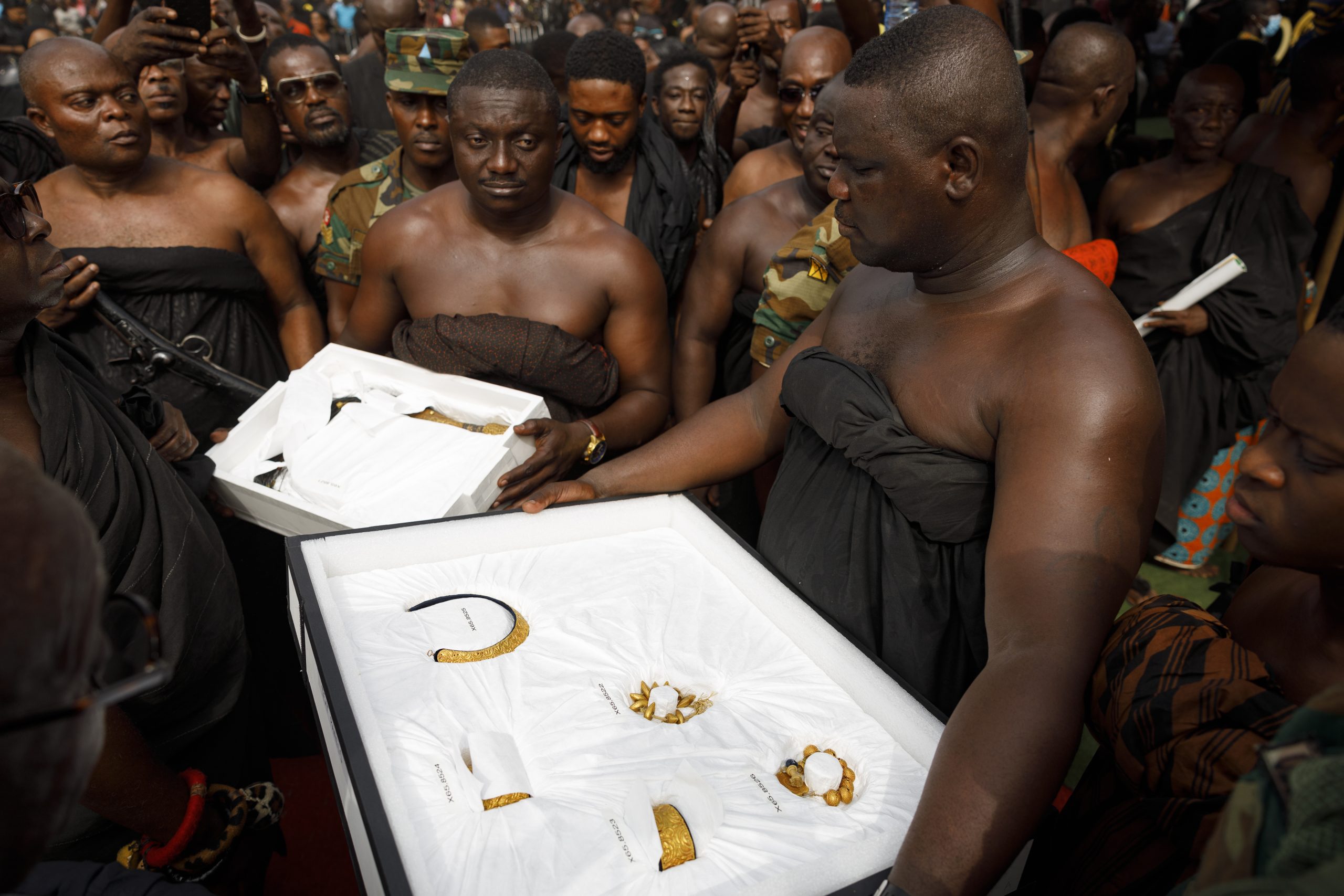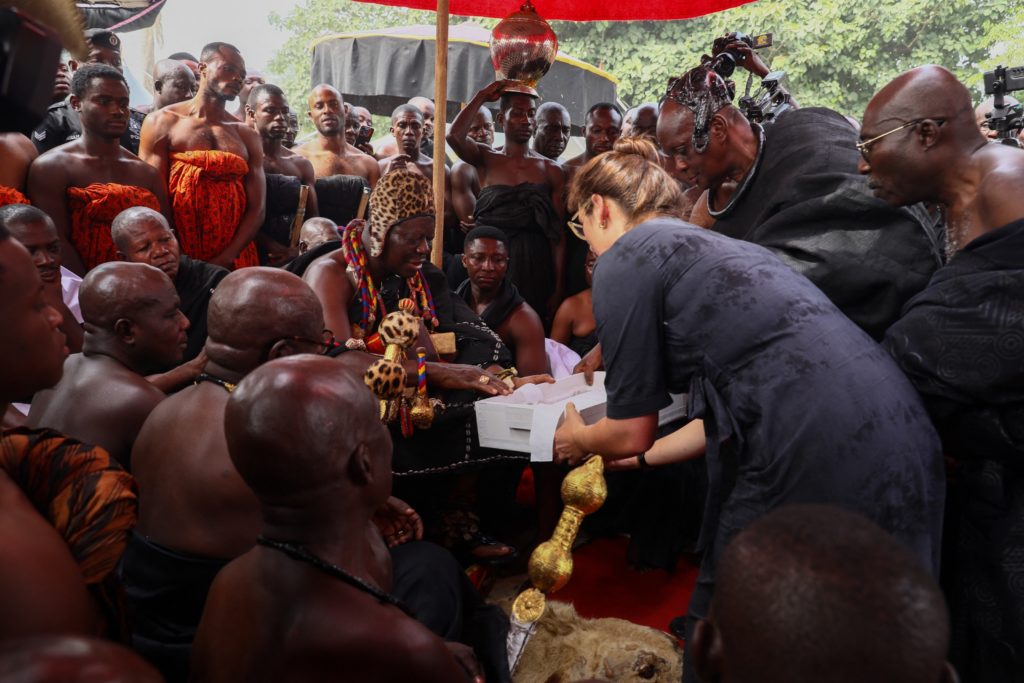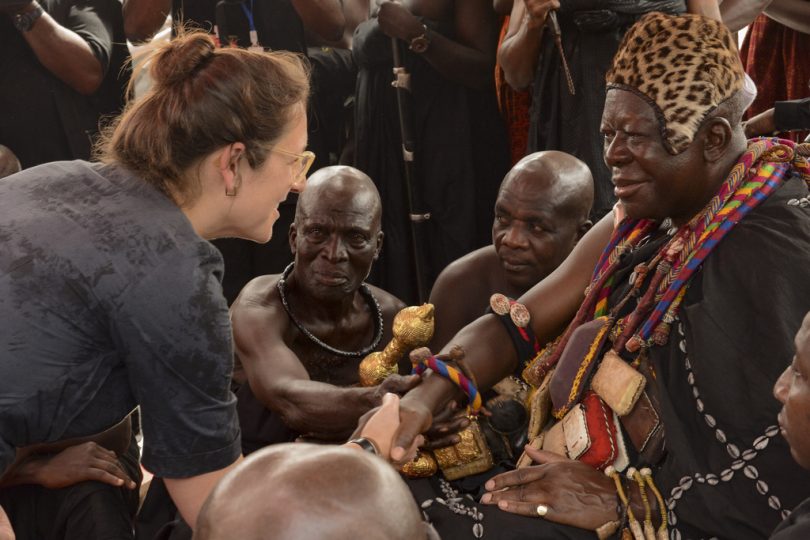In a historic event marked by jubilation and a sense of restoration, Ghana’s Asante kingdom celebrated the return of seven royal artifacts looted by British colonial forces over a century and a half ago. The Fowler Museum at the University of California, Los Angeles, where these artifacts had resided since the 1960s, facilitated their return, acknowledging the cultural and spiritual significance of these items to the Asante people.
The artifacts, which include an elephant tail whisk, an ornamental chair crafted from wood, leather, and iron, two gold stool ornaments, a gold necklace, and two bracelets, symbolize more than artistic mastery; they represent the soul of the Asante kingdom. “The white man came into Asanteman to loot and destroy it,” Otumfuo Osei Tutu, the current king of the Asante kingdom, reflected during the presentation ceremony in Kumasi, emphasizing the historical injustice these artifacts signify.

Artefacts returned from UCLA’s Fowler museum are carried to Asante King Otumfuo Osei Tutu II at the Manhyia Palace in Kumasi, Ghana, Thursday, Feb. 8, 2024. Seven royal artefacts which were looted by British forces from Ghana’s ancient Asante kingdom in the 19th century were returned by the museum, the latest of a series of stolen treasured items now being repatriated to several African countries. (AP Photo/Misper Apawu)
This repatriation, coinciding with the 150th anniversary of the British sacking of the Asante city in 1874, marks a turning point in the long-standing effort by African nations to recover stolen treasures. The return of these items is celebrated not just as a recovery of lost heritage but as the “return of our souls,” in the words of Kwasi Ampene, a lecturer instrumental in the negotiations.
The Fowler Museum’s decision to return the items unconditionally, allowing the kingdom to make replicas for educational and cultural preservation, exemplifies a shifting paradigm in the stewardship of cultural artifacts. Museums are increasingly viewed not merely as repositories of art but as custodians with an ethical responsibility towards the artifacts and the communities from which they originate.

Otumfuo Osei Tutu II (CL), Ghana’s Asante king, receives artefacts returned by the Fowler Museum of UCLA (University of California Los Angeles) to the Manhyia Palace in Kumasi, Ghana, on February 8, 2024. A California museum on February 8, 2024 returned seven royal artefacts to Ghana’s Asante king to commemorate his silver jubilee celebrations in the first hand over of treasures looted during colonial times.
The Ghana handover comes as international pressure grows for European and US museums and institutions to restore African artifacts from former colonial powers Britain, France, Germany and Belgium. (Photo by Nipah Dennis / AFP) (Photo by NIPAH DENNIS/AFP via Getty Images)
The significance of these artifacts extends beyond their historical and aesthetic value; they are emblems of prestige and reverence within the Asante culture. Their return is a dream realized for the people of the Asante kingdom, many of whom grew up hearing stories of the looted treasures from their elders. “Our forefathers and our fathers told us about the artifacts,” shared Samuel Opoku Acheampong, a staff member at the Asante palace, expressing a sentiment of fulfillment and vindication shared by many in attendance.







